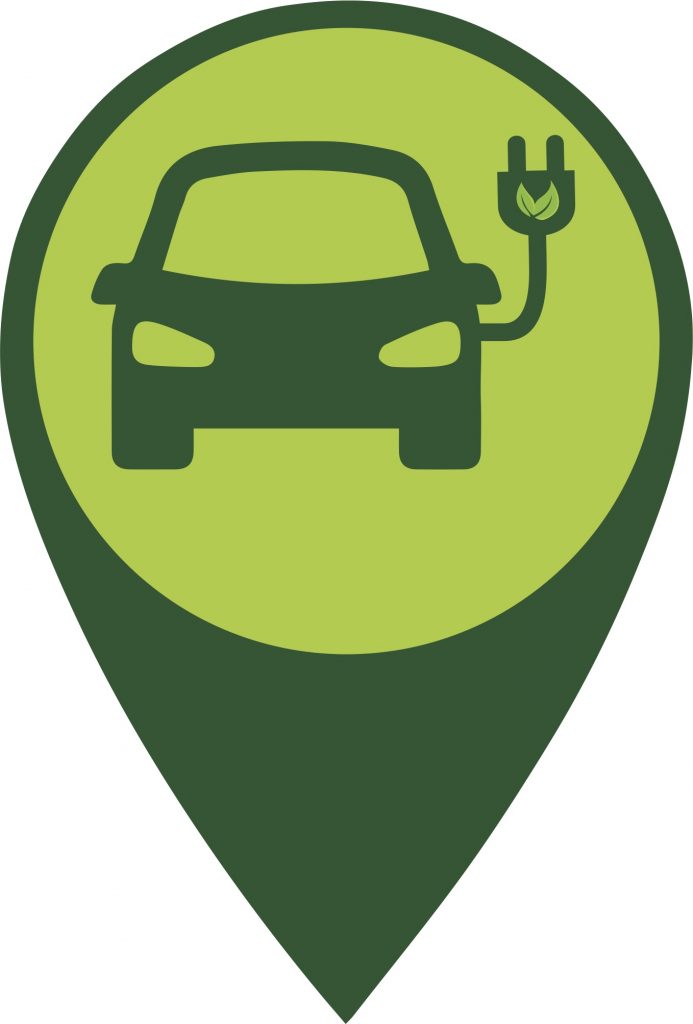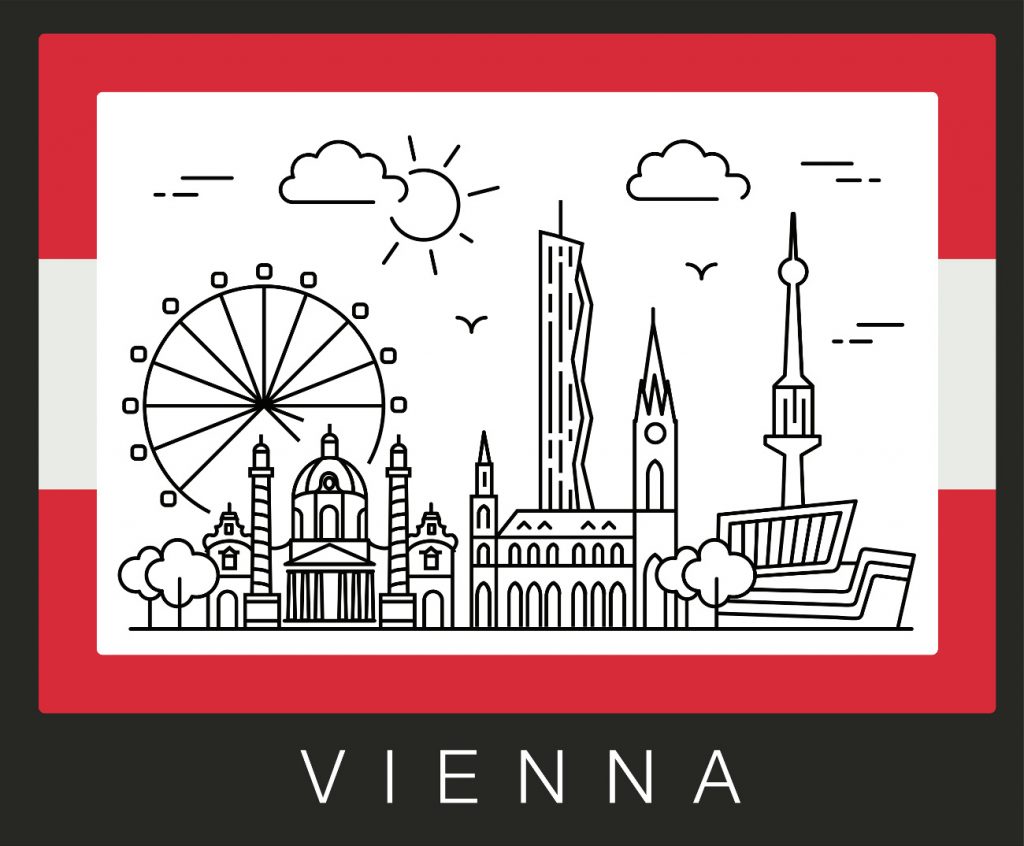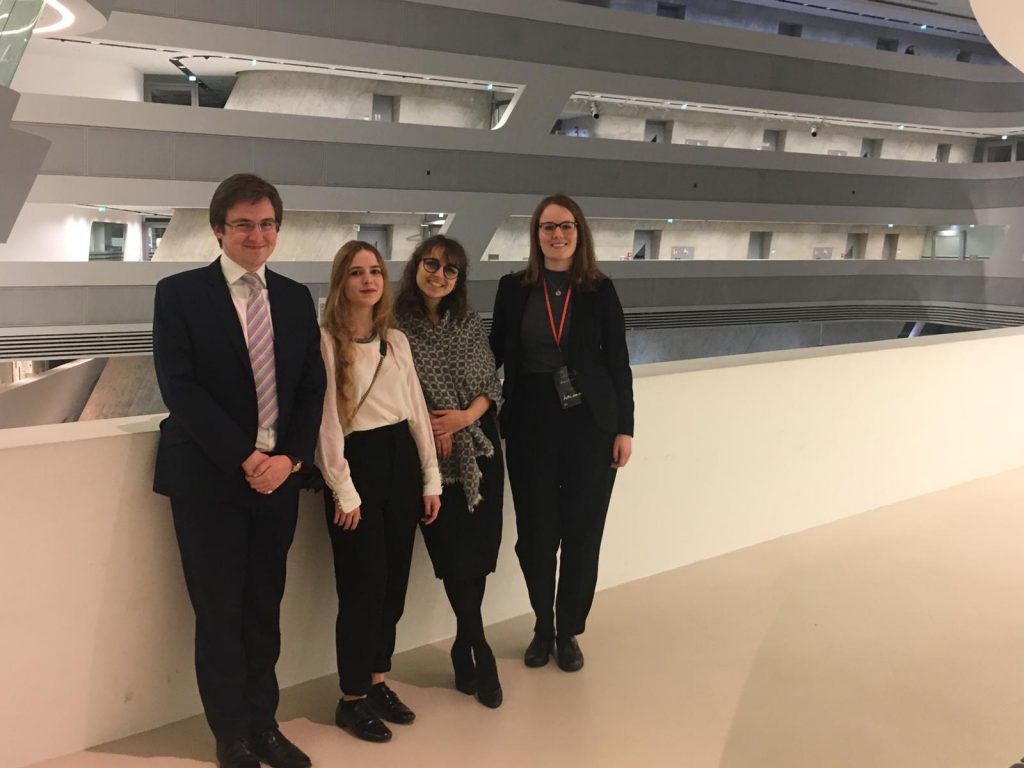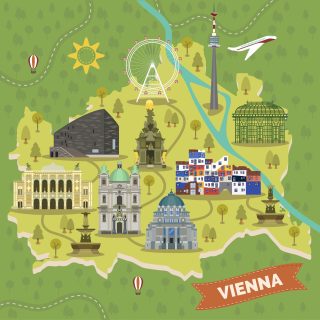This academic year, for the first time, we entered a team into the John H. Jackson Moot Court Competition (one of the competitions run by the European Law Students’ Association – ELSA). Our team was made up of a mix of BPTC and GDL students: Jessica Allen, Margaux Augé, Flora Curtis and Sam Groom. With no institutional experience of the competition in previous years, the four students had a challenging task ahead. Here we hear from the team about what was involved and what it was like at the oral hearings in Vienna.
The John H. Jackson Moot Court Competition, run annually by the European Law Students’ Association, is on an area of law that most law students have no experience of studying: the law of the World Trade Organisation. This is a blessing as well as a curse. Although more time is demanded to get to grips with the basic structures and principles of a new legal system, it is refreshing to engage with something so different from what is covered on a UK undergraduate law syllabus. This was the case for three of the four members of the City team (Jess had studied some WTO law on the BCL course). There was also added interest from the fact that, as time moved from our beginning to prepare in November 2018 to our competing in Vienna in February 2019, the prospect of a no-deal Brexit loomed larger and larger, so that the law we were discovering took on a new, disconcerting relevance.

We were thrilled to be selected in November to represent the university and soon got our teeth into what proved to be a knotty problem, involving trade disputes between imagined countries over an imagined metal, Solaris, used in electric vehicle charging points. To this day, none of us can pass a charging station without a shudder. We crafted a set of written pleadings on behalf of the complainant and the respondent, sending them off for the midnight deadline in what might be described as circumstances of heightened pressure. After submission, we had one month to practise our oral arguments before travelling to compete. Little did we know that the challenge awaiting us would be very different from our mooting experiences in the UK.
We arrived in Vienna on the Sunday before competition week, giving us time to settle into our palatial accommodation and to properly get in the zone. Monday brought the opening ceremony at the Wirtschaftsuniversität, host of the week’s events and proud owner of marvellous buildings, including one stunning spaceship-hangar-esque creation of the late great Zaha Hadid. We learned that we would be presenting on behalf of the complainant on Tuesday afternoon and on behalf of the respondent on Wednesday morning. We heard speeches from the impressive ELSA and ELSA Austria students who were organising the week. Finally, we started the week as we would be forced to go on, and enjoyed some non-vegan canapés before returning to our hotel room.

On Tuesday, it was finally time for us to moot, after spending so many months preparing and waiting. We spent the morning going through our submissions a few final times, and then headed off to the university to get lunch and get mooting!
We didn’t really know what to expect from our first round. We had done a practice moot with an international law specialist at City in the weeks before the competition, and watched some very short clips of previous years’ competitions, but other than that we were going in blind. Fortunately, we had met the team against whom we were going to be mooting at lunchtime. They were also in Vienna without a coach, and unsure what to expect. Before going into the competition room, we all chatted about hoping that the panel of three trade law specialists wouldn’t grill any of us too much.

Unfortunately, our hopes were quickly crushed as the mooting started. The format of the competition was that the three speakers for the complainant team would go first, speaking for a total of 45 minutes, followed by the three speakers for the respondent. As we had drawn the complainant side for the first round, we went first. Almost as soon as our first speaker began, the panel unleashed an onslaught of challenging questions. The questions touched not only on our submissions and the provisions of the WTO agreements that we were arguing about, but also the broader context of international law and the treaties as a whole. We were practically unable to use the speaking-notes we had prepared, and spent the entire time trying to satisfy the panel’s specific requests. It was an incredibly challenging experience. Both teams were fairly shell-shocked when we left the room to await feedback from the panellists.
After taking on board the feedback, we were free to take the evening off. We headed over to a room in the university where we were provided with a pizza dinner. We left early, partly because we wanted to get some more practice in before the second round the following morning, and partly because of a need to find some more food after a miscommunication as to whether it is possible to construct a vegan pizza (it is).
Having learned a lot from the first pleadings, and spent the evening modifying our grounds, we went back to the campus on Wednesday morning for our second pleadings, this time on behalf of the respondent. No longer blissfully ignorant of the style of mooting adopted in the competition, we braced ourselves for an essentially reactive experience.
Overall, this proved to be quite a different exercise from arguing for the complainant. Firstly, the panel seemed more demanding than the previous day, but the main difference was that we now could only raise arguments related to provisions directly developed by the opposing team. There is no exchange of skeleton arguments prior to the hearings in this competition, meaning we had to be very active during their pleadings to amend our grounds accordingly. Perhaps the main difficulty (and frustration) arising out of this was being prevented to raise most of our arguments for the last ground, as the complainant did not have time to develop the related provisions due to the time constraints.
As always, the panellists then gave us feedback and, now feeling relieved to be done with the preliminary rounds, we headed to the Mensa for lunch, where we met and discussed with other teams. After resting at our hotel for a couple of hours, we spent the rest of the afternoon touring Vienna, before heading to the Juridicum (the faculty of law) where the sponsors’ reception and the announcement of the semi-finalists took place in the evening.

Although we hadn’t progressed to the Semi-Finals of the competition, we were very keen to watch the Final on Thursday. After a rather slow start to the day (a lie-in was definitely in order!), we wandered back to the campus at midday to have lunch and chat with some of the other teams. Watching the Final was definitely an eye-opening experience, as we were finally able to measure the standard of the competition. Both teams were excellent and clearly shared a comprehensive knowledge of WTO law, working together throughout their submissions to answer the endless questions posed by the seven panellists. It was very impressive to watch!
After the Final was over, we went to a local Viennese bakery to wait for the final gala dinner and award ceremony, which was also taking place on campus. The gala was hosted at the same venue as the opening ceremony, and, yet again, we were the first team to arrive. The evening began with the award ceremony, with various thanks given by George Manakis, the Vice President for ELSA Moot Court Competitions, and the local Organising Committee. We definitely didn’t expect anything to come out of this portion of the event, but we were happy to share in the successes of the other teams that we had met.
However, to our surprise, we came away with the Award for Best Complainant Written Submissions for one of our written memoranda. We were dumbfounded when our team number was called. Despite not progressing beyond the initial rounds, receiving this award meant that the whole experience ended on a surprising high. Many of the other teams congratulated us, as we did them, during the remainder of the evening. We also spoke with several of the judges from our two panels, who were very encouraging with their feedback and congratulations. With that news, we made sure to make the most of our final night in Vienna and join the other teams to celebrate!

On Friday morning, we awoke with (if we say so ourselves) impressive vigour and set out to see the sights. Before taking the bus back to the airport, we enjoyed a game of Perudo in Café Central, quietly savouring the feeling that facts about Solaris, the Matte Peninsula, and electric vehicle charging points were flowing out of ears, never to return.
Our impression of the competition is overwhelmingly positive. We learned a lot about an area of law and politics new to us; we socialised with students from across Europe, and with some surprisingly fun WTO law academics; we subjected our skills at handling judicial intervention to unequalled trials. We have emerged as more confident and skilful advocates. If City enters a team next year, and if they prepare hard and well, they have a good chance of succeeding, and we would recommend the competition to anyone regardless of their current level of interest in WTO law. It was a fantastic experience and we are very grateful to City, and to Emily in particular, for facilitating it.

